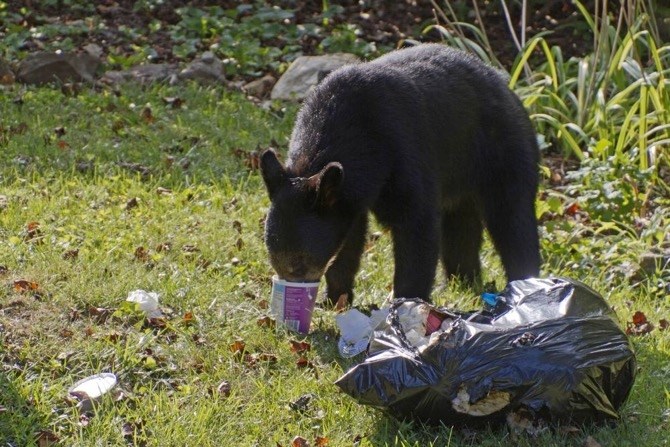
Image Credit: Shutterstock
September 13, 2016 - 6:30 PM
KAMLOOPS - After reports of bears in the Juniper Ridge area unphased by humans, the Conservation Officers Service in Kamloops is warning residents to keep bear attractants out of their yards.
Kamloops conservation officer Jim Metenka says there have been a couple of reports in the last 10 days about one or two different bears near Skeena Drive.
Residents have said on social media the bears weren't scared away by loud noises or objects thrown at them.
Metenka says this isn't a sign of an aggressive bear, just an animal determined to find food. There's no way to prevent these animals from wandering onto your property, but you can take precautions to ensure bears don't spend a lengthy amount of time there.
"I spoke to a few people out there (in Juniper Ridge)... about being diligent with their garbage, being diligent with their fruit trees," Metenka says. Dog food and barbeques are also attractive to hungry bears.
Metenka encourages residents to report any bears they see in town, but says it's important to remember bears are common in rural areas.
"I understand it’s not a common thing to have in your backyard, but it’s where we live," Metenka says.
He says some residents could be scared to report bears in town for fear of the animal being destroyed, but Metenka says that's a last resort for officers.
"Unfortunately we don't relocate black bears in B.C.," Metenka says. "If we end up having to intervene, we end up having to destroy the bear."
Officers don't relocate black bears due to the very low success rate of those animals after relocation. The bears usually are more aggressive when they come back into populated areas after being relocated.
Another issue, Metenka says, is trying to relocate bears who have been conditioned to human food.
"You're going to take a bear that's been food-conditioned and put them out into the wild where there's not a great food source."
Metenka says this could lead to the animal starving to death, especially during hibernation.
“It’s better if we can just dry up the food sources (in town) so they can wander on," Metenka says.
WHEN SHOULD YOU CALL?
Metenka says residents should always report bear sightings if the animal is spotted in town. He stresses conservation officers receive every call and try their best to respond to each one, so residents shouldn't feel like their call isn't being taken seriously.
“We like to know when bears are in town. A bear in town can at any time become a safety concern," Metenka says. "It's good for us to know where they're showing up."
Conservation officers try to work with the communities and talk to the people who called the bears in to get an idea of how the bears are acting, how many there are and what kind they are.
Metenka says after bears are reported in populated neighbourhoods, officers try to get the attractants cleaned up and educate the community on how to reduce the time bears spend in these areas.
Residents should call conservation if they've noticed a bear before, but its personality has changed.
“If they notice something changing in the bear where there’s an increased aggression, they’re out in the middle of the day, becoming more bold," Metenka says.
Metenka says this time of year is crucial in ensuring your property and your neighbours' properties, are bear attractant-free.
If you see a bear in your neighbourhood, call B.C. Conservation Officers Service at 1-877-952-7277.
To contact a reporter for this story, email Ashley Legassic or call 250-319-7494 or email the editor. You can also submit photos, videos or news tips to the newsroom and be entered to win a monthly prize draw.
We welcome your comments and opinions on our stories but play nice. We won't censor or delete comments unless they contain off-topic statements or links, unnecessary vulgarity, false facts, spam or obviously fake profiles. If you have any concerns about what you see in comments, email the editor in the link above.
News from © iNFOnews, 2016